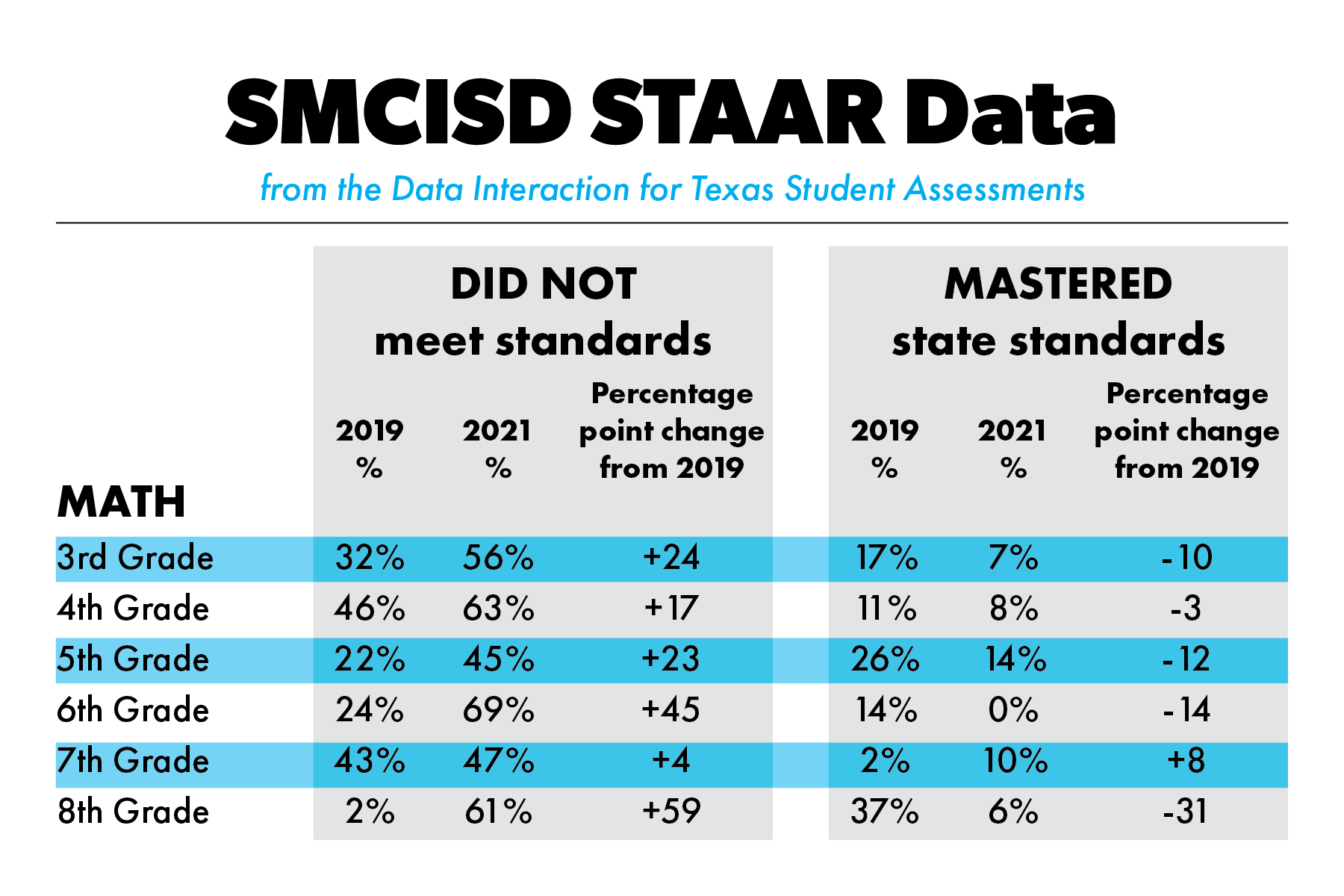
Daily Record infographic by Colton Ashabranner
SMCISD testing results mirror statewide trends
Test results for the 2021 Spring State of Texas Assessments of Academic Readiness showed declines across the state, especially in mathematics, according to results released Monday by the Texas Education Agency.
San Marcos Consolidated ISD was not immune from statewide STAAR result trends. In mathematics, scores show a majority of SMCISD students in third-eighth grades did not meet readiness standards. Scores in the approaches, meets and masters performance levels all declined from spring 2019 results — the last year STAAR testing was administered.
SMCISD Superintendent Dr. Michael Cardona said he was disappointed that the TEA and U.S. Department of Education unnecessarily mandated standardized testing during a pandemic.
“Everyone recognizes the need to address the socio-emotional needs for staff and students,” Cardona said. “Implementing a standardized testing system during an unprecedented time created unnecessary trauma and stress for many communities. We always strive to get our students college and career ready but once again we were forced to focus on a flawed testing system that isn’t used by the military, colleges, or business community. ”
“I am grateful there is a pause in accountability, but this practice of using a test that no one recognizes outside of TEA and the USDOE creates unnecessary trauma,” Cardona added.
The TEA gives four performance scores from “did not meet” to “masters.”
TEA defines the “did not meet” standard as a student didn’t meet grade-level learning goals and they’ll need significant help in the subject, while “masters” means a student shows a strong understanding of the course content.
At SMCISD, the data shows that 56% of 479 third-grade students tested did not meet performance level in mathematics — an increase of 25 percentage points compared to 2019. Sixty-three percent of 490 fourth graders, 45% of 548 fifth graders, 69% of 343 sixth graders, 47% of 182 seventh graders and 61% of eighth graders who were tested scored in the “did not meet” performance standard level in mathematics. San Marcos High School saw similar trends with its algebra I end of course exam. Fifty-eight percent of 658 students who took the algebra 1 test failed the test compared to only 35% of test takers in 2019.
Across the board, SMCISD saw similar declining trends in all exams except for STAAR end of course exams for English I, English II and U.S. History.
Texas Education Commissioner Mike Morath said it is “painfully clear that the pandemic had a very negative impact on learning.”
“Thankfully, from early on, Texas prioritized the availability of in-person instruction during this tremendously difficult year,” Morath said. “When students come into Texas public schools, they are well-served by Texas educators — a fact that these scores confirm. But it is also painfully clear that the pandemic had a very negative impact on learning. I shudder to consider the long-term impact on children in states that restricted in-person instruction.
“Now, we have full assessment results in hand for nearly all Texas students. The data may be disheartening, but with it, our teachers and school leaders are building action plans to support students in the new school year.”
According to the TEA, school districts that had a higher percentage of students learning virtually experienced a greater degree of declines, while districts that had higher percentage of students learning in-person “largely” avoided any learning declines in reading.
SMCISD reading scores only saw modest declines. Third-eighth grade reading test takers only saw declines of less than 10 percentage points in the “meets” standard score.
Looking forward, Cardona said superintendents have been asked to reimagine education post pandemic but the “outdated” testing system should also be reexamined.
“Our staff has been resilient throughout this pandemic and currently the testing system is not innovative, adaptable, or fluid enough to truly measure the worth of students,” Cardona said.











